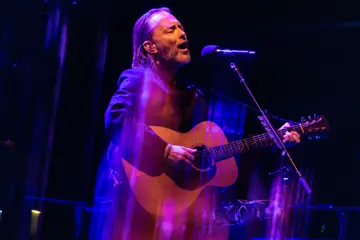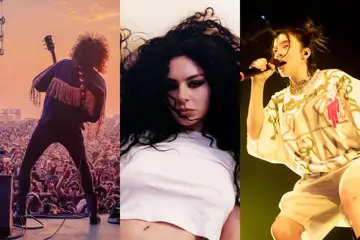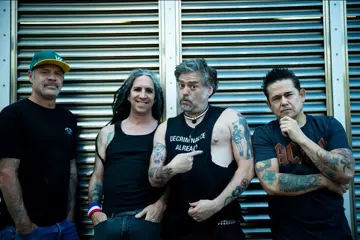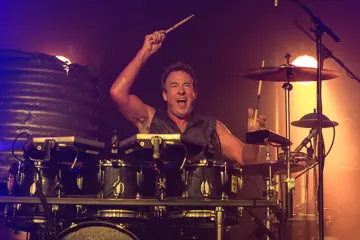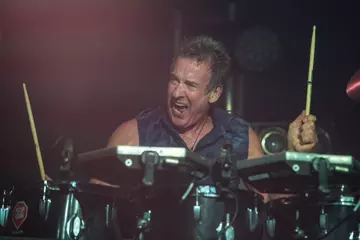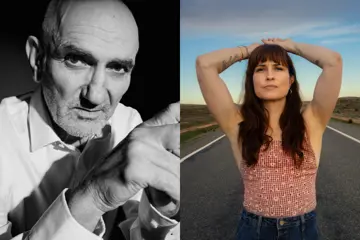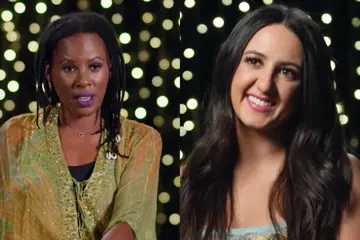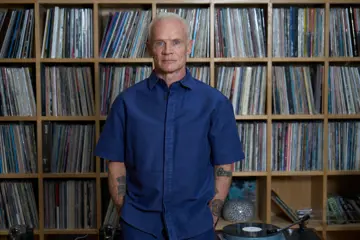 Spinifex Gum
Spinifex GumHaving won themselves legions of fans for their work with The Cat Empire, Felix Riebl and Ollie McGill are trying something a little different with their new project, Spinifex Gum, the self-titled debut album for which is released this week.
Joined by Cairns-based choir Marliya, for whom the project was created, the full-length features an exceptional cast of guest performers, including Briggs (A.B. Original), Midnight Oil's Peter Garrett and acclaimed singer-songwriter Emma Donovan.
Throughout its tracks, the full-length addresses weighty themes and pervasive issues faced by our Indigenous population on a daily basis, from the social disparity present in the Pilbara (Spinifex Gum) to deaths in custody (Ms Dhu), disproportionate incarceration (Locked Up), land rights (Yurala) and more.
It's an artistically stunning, thoughtful and evocative collection of songs that demand to be heard, and we at The Music are honored to be premiering the album today.
Spinifex Gum's self-titled debut album — made possible with the support of donors including the Ryan Cooper Family Foundation, the Lightfolk Foundation and Creative Partnerships Australia, through the Australian Cultural Fund — will be released tomorrow, 27 October.
While you listen, you can read through the stories behind each of the tracks, straight from Spinifex Gum's minds to the written word, below.
Spinifex Gum — Spinifex Gum: Track by Track
SPINIFEX GUM (ft. Marliya)
Some things stick like Spinifex Gum like ants on honey like money on scum.
Don't miss a beat with our FREE daily newsletter
When Spinifex grass is burned the roots melt and make a gum strong enough to join spears. You never forget the feeling once you’ve touched it. That feeling stayed with me and I liked the words SPIN-I-FEX GUM, and after that the lyrics wrote themselves and it became the title track.
It begins with an iron-ore train sampled and tuned to make a metallic synth. A bouncing basketball recorded in Roebourne becomes a bass drum, and so on, with gravel, engines, rocks, shake-trees, and mining industry all featuring throughout. The song bites into aspects of contemporary life in the Pilbara — disproportionate wealth, media distortion, FIFOs, political spin — but also a landscape that can’t be measured in numbers, the power of youth, an optimistic future; a return home. It also marks the beginning of an album written for and championed by the Indigenous teenage choir Marliya.
And the future sees in the eyes of the young, some things stick like Spinifex Gum.
MS DHU (ft. Felix Riebl + Marliya)
Will we ever see a cop locked up for negligence?
Will we ever see the rock turned up on ignorance?
Will we ever see a government who first listens?
Will we ever see the stats fall in black prisons?
Did Dhu die for nothing? No she didn’t!
Ms Dhu is a protest song. It tells the story of the tragic and totally unnecessary death of a 22-year-old Aboriginal woman who died while in police custody in South Headland in 2014. I heard about the case while travelling in the Pilbara, writing songs and performing with members of the choir who feature on this album, and the joy of that experience made the proximate tragedy of Ms Dhu — not much older than the young singers I’d been working with — all the more terrible to me.
We’ve dedicated this song and its proceeds to her family, who continue to search for justice in the face of endemic, institutional racism. We hope it serves as a statement of solidarity with them and the Indigenous community as a whole.
LOCKED UP (ft. Briggs + Marliya)
Maximum punishment, rehab is minimal, treat them like that you just make them better criminals … Why’re the kids locked up? Take this silence and blow it up.
Locked Up, the album’s bomb-track single featuring Yorta Yorta rapper Briggs (of A.B Original) and Marliya, takes aim at the disproportionate rate and disgusting treatment of Indigenous youths in juvenile detention. Its uncompromising and powerful statement — released at the time of the Royal Commission into the Protection and Detention of Youths in The Northern Territory — is accented by the voice of Senator Patrick Dodson that echoes over the song’s chaotic outro and closes with:
"The statistics speak for themselves and the cold hard fact remains an indictment on all of us."
YURALA (ft. Marliya)
In Yindjibarndi, ‘Yurala’ means rainmaker.
Hey! I’m Yurala I know this ground
I’m Yurala don’t dam it down
And the river’s my body
Can you hear the thundering clouds?
This song tells the story of the Yindjibarndi elder and rainmaker Long Mack, who fought hard to stop the Harding Dam being built over the section of river he was custodian (Ngurrara) for. In Yindjibarndi culture, the land a person is responsible for is considered to be a part of themselves. When the land rights case was lost, the dam built, and the sacred sites around that area drowned, Long Mack returned from court in Perth to the Pilbara and died of a broken heart. He is still considered a great leader amongst his people. Our thanks and respects go to Angus Mack and the Mack family for allowing us to tell this story.
MALUNGUNGU (ft. Peter Garrett & Marliya)
In Yindjibarndi, ‘Malungungu’ is the name of a creepy, goggly-eyed spirit.
Running on empty, my wheel hand knuckle white
Before the day finds an ending, I’m going out to the other side
While travelling in the Pilbara, I spent a lot of time driving at night and became fascinated by the darkness on the other side of the crossing once the seemingly endless iron-ore train had passed, and the loud, red flashing lights had stopped. At that time, I’d been watching news stories about the recent spate of FIFO suicides in the area, and I’d also learned about a mass killing of Indigenous people (the Flying Foam Massacre) in the area from colonial times, events which are both touched on in the lyrics. This song, named after a creepy spirit in Yindjibarndi culture, which frightens black fellas but is itself scared by white people, imagines the inner voice of a FIFO worker, performed by Peter Garrett, driving at night and heading into that darkness.
GAWARLIWARLI (ft. Marliya)
In Yindjibarndi, ‘Gawarliwarli’ means butterfly.
Gawarliwarli I’m a lightfoot bandit
Gawarliwarli I’m kicking up dirt
And you’ll never ever know where I’m standing
Gawarliwarli I’m a light in this world
During one of my several trips to the Pilbara, I performed at the Roebourne Amphitheatre with the Gondwana Indigenous Children’s Choir. Members of that choir went on to form Marliya. Many locals turned up to see the performance and the night was full of kids laughing and darting around in the darkness. I had my field recorder with me, and one of the sounds that struck me was the rhythm of lightning feet running over a metal grate. That’s the sample that begins the song and sets the odd time signature. There’s a lot of negative press about Indigenous kids in communities around Australia, but it struck me that the youths in those areas know a lot more than they let on. Law — in the Indigenous sense of the word — is strong in the Yindjibarndi community. That’s part of what this song is about — the hidden knowledge of teenagers, and their speed to dodge pointed fat, judgmental fingers.
MARLIYA (ft. Marliya)
In Yindjibarndi, ‘Marliya’ means bush honey.
Nothing is as sweet as you my friend, you’re my Marliya…
This is a song about friendship. This music started with these young singers, and the bond I’ve seen amongst them has been an ongoing inspiration. Perhaps that’s why this track also became the name of the album group. It’s a special friendship that unites a choir, because performing involves turning many voices into one…
LANG INTERLUDE
“I believe, bad and all as it is, that the greed of capitalism is the only driving force there is.” These are the words of Lang Hancock in 1971.
As part of my research for writing these songs, I went into the mines, recorded industrial sounds, and learned about the iron ore industry. It’s staggering how such a great proportion of Australian wealth is controlled by so few, how the notion of self-propelled capitalism is embodied in the relentless trains, and how evident the existence of a double economy is when you go to the mostly Indigenous community of Roebourne just 30 minutes inland from Karratha.
This song quotes Lang Hancock and challenges the idea that “capitalism is the only driving force there is…” by literally breaking down those words. The voice in this track is of the late Yindjibarndi/Ngarluma Elder, Roger Solomon, and is sampled from the film Exile & The Kingdom. We thank the family and Yindjibarndi community for allowing us to use it in this way for this recording.
MAKE IT RAIN (ft. Emma Donovan + Marliya)
This song starts with falling coins merging into the sound of rain and thunder, and the rhythm track is of an iron-ore train dropping off its heavy cargo. There’s something about money, storms and heartbreak in the Pilbara that sparked the idea of covering the Tom Waits song Make it Rain and translating the last verse into Yindjibarndi. Emma Donovan’s deep and soulful voice feels as if it was made for this one, and we thank Michael Woodley for his generous help with translation.
WANDANGARLI (ft. Marliya)
In Ngarluma, ‘Wandangarli’ means going crazy.
I’ve been into town I’m losing my head – wandangarli!
While in Roebourne searching for songs, I came across comic books and videos by the Love Punks and Satellite Sisters, who are space-travelling characters created by the kids in the area. They invented the word ‘wandangarli,’ which means something like going crazy. This song uses that word as its chorus hook, and looks at the different atmospheres of town life and being on country.
DON’T SHUT THEM DOWN (ft. Marliya)
While this album was being written and recorded, it was revealed that the government had listed 126 remote Indigenous communities for closure. There were extensive protests around the country as a result. Many of those communities were in the Pilbara and Kimberley regions of WA. This song names some of those places and in no uncertain terms protests: Don’t Shut Them Down!

